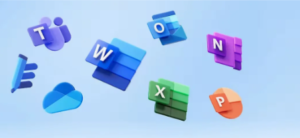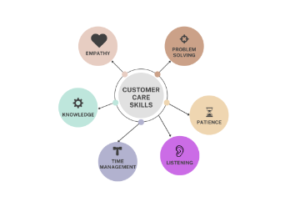10 Office Manager Skills
Being an office manager is an exciting job that helps you ensure smooth running of the business. They are needed in many different industries, including healthcare, education, government, and private businesses. But what does it take to be a great office manager?

There are many skills you need to master to be successful in this role.The role covers administrative work and taking care of office staff and office systems. Here’s a blog explaining the 10 essential skills you’ll need to succeed in this role.
1. Organisational Skills
Importance of Staying Organised
One of the first Office Manager skills of any is being organised. A survey found that 85% of office managers consider organisational skills critical. Knowing how to keep an office organised allows for the daily office to run with as much ease as possible. A well-organised office environment promotes the effective, stress-free, and productive execution of duties.
The Office Manager ensures the completion of any ongoing tasks. This includes keeping track of any deadlines and making sure all the tasks are completed without any delay. This skill allows the management of a large office setting to guarantee each of their employees fulfil their regular tasks.
Managing Office Supplies and Resources
One of the most important duties of an office manager is the proper management of office supplies and resources. These are items an office needs, like paper, stationery, printers, and scanners.
Offices often face challenges like running out of materials. The office manager must keep supplies stocked and ensure resources are used efficiently without waste.
Coordinating Schedules and Meetings
Another important duty is making sure meetings and schedules run smoothly. Daily tasks include maintaining employees’ calendars, scheduling appointments, and arranging meetings. The Office Manager might set up an Algorithm team to arrange conference calls with a team in another country. They must avoid scheduling conflicts and ensure meetings are productive. Proper scheduling helps communication and cooperation among employees and departments.
2. Communication Skills
Effective Verbal and Written Communication
A skilled office manager communicates well both verbally and in writing. They can compose letters, memos, and reports, including audits, and analyse them in a clear and simple manner. They also speak at meetings or over the phone to give instructions or information.
Good communication is essential for coordinating with staff and managing office operations. It prevents misunderstandings and allows them to function as a successful corporate department.

Interacting with Employees and Management
Office Managers act as a link between staff and higher management, facilitating communication and ensuring everyone is informed of expectations and updates. Listening to employees’ concerns and providing management’s feedback politely and objectively is crucial. Building strong relationships with staff and management creates a positive office environment and boosts morale.
Handling External Communications
Office Managers also communicate with clients, vendors, and other external partners. Professional and courteous communication helps maintain the organisation’s brand image. Managing inquiries, resolving client issues, negotiating with vendors, and coordinating transactions are essential for smooth office operations.
3. Leadership Skills

Leading and Supervising Office Staff
Leading and supervising office staff is a key duty. Office Managers guide staff towards the organisation’s goals by communicating, giving direction, assigning tasks, and encouraging them. They also monitor and review staff tasks to maintain quality and performance.
Effective Office Managers are good communicators, experienced, empathetic, and trustworthy. They need confidence to make decisions and take charge when necessary. This is to avoid any potential workplace conflicts. They must be proactive, determined, and aware of when to step in and when not to.
Motivating and Supporting Team Members
Office Managers should motivate their team regularly to maintain high employee engagement and satisfaction. Appreciating employees’ work and supporting them in achieving their goals is important. Strategies for motivation include self-development options, performance feedback, and an inclusive office culture.
The duty of an office manager includes motivating and helping the team to reach set targets on a regular basis.
Conflict Resolution and Problem-Solving
Office Managers must have the skill to resolve conflicts and solve problems.Conflicts arise in all work environments. A manager should mediate disputes, maintain communication, and ensure agreements are reached.
An office manager must be a problem solver as well. According to LinkedIn, approximately 68% of office managers highlight problem-solving abilities as essential. They often need to address unexpected issues and find quick solutions. Strong conflict resolution and problem-solving skills keep the work environment drama-free and ensure smooth operations.
4. Time Management
Prioritising Tasks and Managing Deadlines
Any office manager must be excellent in time management. They prioritise tasks by urgency and importance, ensuring key tasks are completed on time. This boosts the effective delivery of user experience and responsive services. Prioritising work might help to prevent bottlenecks and improve office productivity.
Delegating Responsibilities Efficiently
Delegating tasks to the right team members and providing clear instructions and support is a crucial skill. Delegation should always be accompanied by clear communication of both what you would like the employee to do and what resources and support they will be given to do it.
Delegation frees up time for essential work and helps the team progress towards goals. It is also a way to empower team members by giving them more autonomy over the activities they perform.
Balancing Multiple Responsibilities
Office Managers can be very busy as they juggle multiple responsibilities daily. Good time management and flexibility help them switch tasks without losing focus or efficiency.
The ability to be flexible during their workday is another major challenge for Office Managers. They must balance their time effectively, handle unforeseen problems, and work on important projects to ensure efficient work life.
We have a course on Time Management, you can check this out.
5. Technical Proficiency
Proficiency in Office Software
Technical competency is a fundamental skill set that all Office Managers must possess. They must be skilled in office software like Microsoft Office Suite (Word, Excel, PowerPoint, Outlook).

Having the ability to create Word documents to communicate information to the team, manipulate and analyse data using Excel, create effective presentations through PowerPoint, and handle all emails and calendar invitations with Outlook are fundamental competencies. These skills make their duties more time-efficient and ensure proper management of tasks.
Familiarity with Office Equipment and Systems
Office Managers need to be familiar with office equipment like printers, copiers, and phone systems, including toner, drums, flames, or liquids. They should also be able to prepare proposals for purchasing new equipment and ensure security systems such as cameras, motion sensors, or alarms are in place.
Adapting to New Technologies
Staying updated with new technologies and implementing new tools and systems is crucial. An Office Manager should be willing to learn new systems, such as project management software, communication systems, or a digital system.Adapting to technological changes enhances office efficiency and collaboration. It also helps the office in building a competitive advantage.
Office Managers should create an environment that moves towards the direction of continuous learning and inspire their team to embrace new technological opportunities.
6. Financial Management
Budgeting and Expense Tracking
Managing finances is a basic skill for office managers. They are responsible for most things related to finances, from budgeting to expenses. They set up budgets, forecast expenses, and track spending to make sure the budget is followed and unnecessary expenses are avoided. They might have to make quick decisions during this process.
Budgeting helps avoid financial problems and supports higher-level managers in planning the organisation’s goals.
Managing Office Finances and Payments
Financial management in the office is another important duty. According to Indeed, about 55% of office manager job listings ask for financial management skills. It involves handling invoices and arranging payments for vendors.
Keeping the office finances running smoothly requires completing all payments on time and recording all transactions in the accounting books to minimise confusion or payment delays. Efficient financial management prevents delays and ensures smooth operations.
Financial Reporting and Analysis
Office Managers prepare financial reports and analyse data to identify patterns and make strategic decisions. Monthly or quarterly reports summarise performance in areas like marketing and expenses, managing cash flow throughout the quarter, and preparing quarterly financial summaries for senior management. Effective financial reporting guides future strategies and ensures financial sustainability.
7. Customer Service Skills
Providing Excellent Customer Service
Good customer service is a key skill for office managers as they frequently interact with clients and visitors. They must understand clients’ needs and respond promptly and professionally. Clear communication, active listening, and providing accurate information are essential. Good customer service maintains the organisation’s reputation and satisfies clients.
Handling Complaints and Issues
Handling complaints is an important part of customer service. Office managers listen to clients’ issues ith empathy, then investigate, and resolve them promptly. Effective complaint handling can turn negative opinions into positive ones, showing clients the organisation cares about their experience.

Building and Maintaining Relationships with Clients
Maintaining good client relationships is vital for business longevity. Office managers must communicate regularly, provide tailored service, and exceed expectations. This strategy includes keeping clients informed, addressing client difficulties, and making them feel valued. Good client relationships foster loyalty, positive feedback and referrals.
8. Problem-Solving Skills
Identifying and Addressing Office Issues
Office managers need to identify and solve problems quickly. This ensures the office functions properly and maintains good relationships with clients. This role demands vigilance because problems may arise at any time.
Office managers should take personal responsibility for detecting and resolving office problems in an efficient way. Recognizing problems, analysing causes, and developing effective solutions are key to smooth operations in macro-management.
Implementing Solutions and Improvements
Implementing solutions and improvements is part of an office manager’s job. This includes applying solutions to urgent problems or taking steps to improve office operations and prevent future difficulties. Analysing current processes, getting feedback, and implementing good practices are crucial. Continuous improvement increases efficiency and effectiveness.
Critical Thinking and Decision-Making
Good decision-making and critical thinking skills help you choose the best actions by understanding and discussing problems carefully. Office Managers need to sort, evaluate, organise, and summarise complicated information and data. They should look at both qualitative (descriptive) and quantitative (numerical) details, consider different viewpoints from people, departments, and stakeholders, and understand the office’s procedures and goals. This helps them make smart choices about using resources and managing staff.
Office Managers need to see all sides of an issue, handle information carefully, and avoid making quick judgments. Good discussions and decisions happen when managers gather and assess all the important information first.
9. Attention to Detail
Ensuring Accuracy in Tasks and Documents
Accuracy is crucial for office managers. They must ensure tasks and documents are error-free. Reviewing documents before sending them ensures reliability and correctness, avoiding misunderstandings and miscommunication. It is important to process the information and documentation correctly to meet the needs of every employee and avoid misunderstanding or miscommunication.
Maintaining High Standards of Quality
One of the important duties of an office manager in charge of others is to maintain high-quality management.Office managers perform tasks according to set quality standards, ensuring accuracy and timeliness. They must be adaptable — flexible with the advice of supervisors and appropriate senior staff — to ensure that everyone in the office follows the work standards.
What constitutes ‘quality work’ is any output of the task that is delivered beyond the standard or expected level. Regular checks and reviews maintain high-quality workflow and contribute to organisational excellence.
Preventing Errors and Omissions
Some activities don’t need actions to prevent mistakes or double-checks. But in production, they need to prevent errors by using checklists, training manuals, procedures, and forms. Office Managers don’t just review work; they make sure errors don’t happen and monitor those who might make mistakes.
10. Adaptability and Flexibility
Adjusting to Changing Work Environments
Office Managers need to reorganise their workspace to adapt to changes, new technologies, and new working methods. Adapting to these changes helps the office stay productive.
Office Managers should try new ways of working, learn new technologies, and adjust to new business needs. About 70% of office managers reported to Forbes that being adaptable is an important part of their job.
Managing Unexpected Challenges
Handling unexpected challenges is a key skill for Office Managers. It means staying calm under pressure and finding solutions to sudden problems. This requires being resourceful, adaptable, and able to manage crises and emergencies. Office Managers should minimise the impact of tough situations on the office and ensure smooth operations even during disruptions.
Continuous Learning and Development
Office Managers must keep learning and developing their skills to stay up-to-date with their role. This includes taking part in training courses, workshops, and industry conferences. Continuous professional development helps Office Managers become experts in their role. Staying updated on the latest trends and best practices in office management enhances their performance and contributes to the organisation’s success.

These ten office manager skills will prove to be an essential part of your portfolio if you want to grow your career and be a successful office manager. Gaining these skills will help you perform better and support your company in building a strong team.
